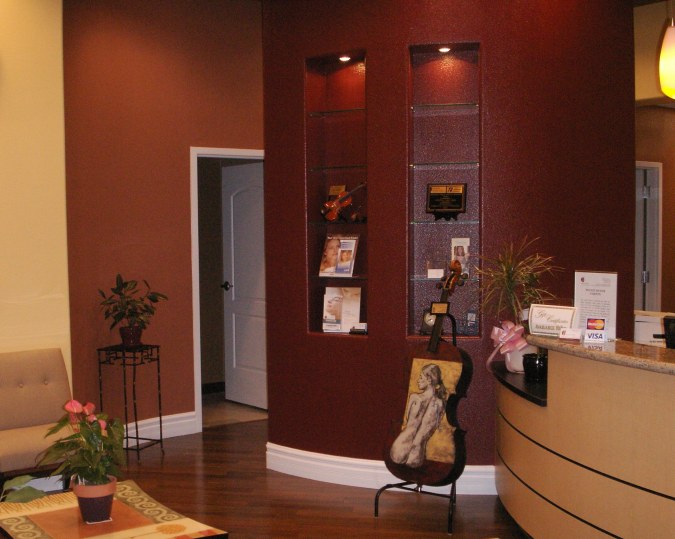Dr. Calvin Lee, Surgical Artistry In Modesto, California
Building and managing a medical spa, vein clinic and cosmetic practice with his plastic surgeon wife is truly a dream come true for this physician.
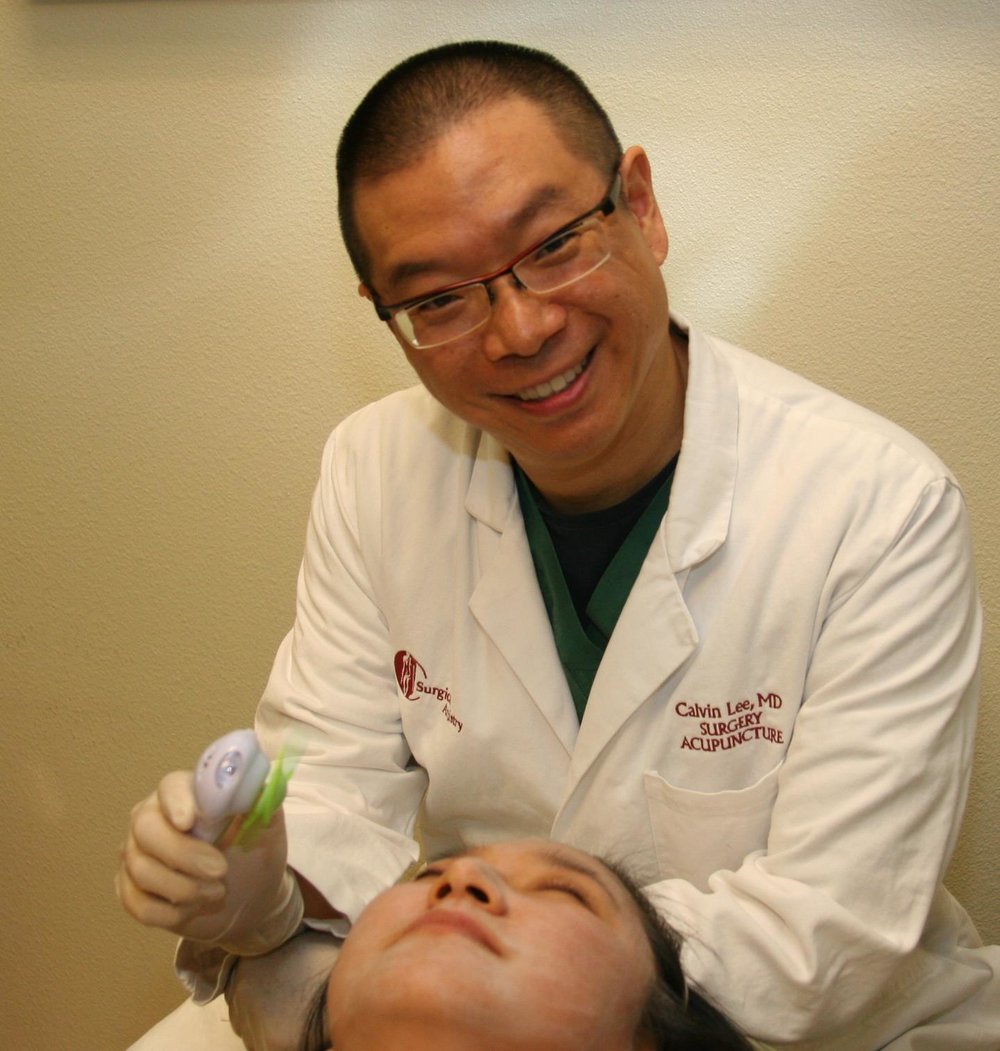
Name: Calvin Lee, MD
Location: Modesto, CA
Clinic: Surgical Artistry
Modesto Plastic Surgery
Websites: SurgeryToday.com, InjectionArtistry.com, BigVeins.com
Thats interesting: Dr. Calvin Lee is a regional speaker for Allergan. He has lectured about the Latisse product in Reno, Fresno, Modesto, Santa Rosa, and Napa.
The genesis of Dr. Calvin Lee as an aesthetic physician
I was a busy general surgeon with a heavy load of trauma surgery. Conflicts with my six member general surgery group landed me without a job. This allowed me to reflect upon how I wanted to prioritize my time and my life. I wanted to spend more time growing artistically with my violin. I also wanted to continue making web pages to share information. And most importantly I wanted to spend more time with my wife who is a plastic surgeon. During my phase of soul-searching, I enrolled in a year long Medical Acupuncture course affiliated with Stanford University and added acupuncture to the list of skills that I have.
In 2006, my wife and I started Surgical Artistry which is mainly a plastic surgery practice.
I have found ways with my skills to join her plastic surgery practice and it was my attempt to combine the things that made me happiest. I was able to work with my wife. I could promote surgery and injections as an art form. I have almost no night call which allows me to play violin in the evenings. I can now make web pages for my own practice. There's a lot of web pages that can be created when one has their own practice. I love making web pages and sharing information - I still wish there were more time for that.
I got the idea to consider cosmetic medicine by responding to a my wife's need for expansion. She was so busy performing cosmetic surgeries, that she didn't have time to give quality service to her Botox, filler, and skin care patients. I decided to fill that need by taking over that area of her practice. I carried to the practice a previous background in treating varicose veins and spider veins. It was a good marriage of skills. We are both surgeons and could help each other in surgeries. These days, my surgical adventures involve helping her in her surgeries. I do very little of what is generally considered general surgery. She showed me her techniques for Botox and fillers, and since then, I've elaborated on them, and I believe that I've taken them to the next level (with many more levels to achieve and improve upon). I definitely benefited from the reputation that she started. I would hear the phone conversation in the office "Dr. Lee, who is Dr. Wu's husband, does the injections in the practice." Initially the patients would schedule because they would be intrigued and wanted to meet Dr. Wu's other half. And this was back in 2006. I'm glad I was able over the years to live up to her good reputation.
Cosmetic medicine is very attractive to me because it is more of an art form than any of the surgeries I've done in the past. I've always wanted to do procedures that appealed to one's positive emotions rather than be a scientific automation. Creating happiness with patients interested in enhancing their looks appeals to me like playing the violin for an audience. I feel that this is a great fit for my desire to demonstrate artistry with dexterity.
How did you first learn aesthetic medicine?
I used my vein surgery skills from my general surgery days for the vein portion of our practice. I took additional training classes to learn cosmetic acupuncture. My wife is a plastic surgeon and she taught me the basics of Botox, filler injections and skin care. I took advantage of the free courses offered by skin care product companies, and kept an open mind. I also attended some injection courses at the time. Furthermore, I attended many aesthetic medicine, plastic surgery, and facial plastic surgery meetings and purchased several great books on the field. All of this was mainly in the year 2006 when I was starting the practice. I really wasn't very busy at the time clinically, so I had time to attend courses, read the books, and practice injections on staff and family members - all volunteers of course. But with all the other activities plus running the office, my time was full, and I didn't have time to practice general surgery.
To slightly boast, my aesthetics practice doubled in the number of patients every two years since 2006 till 2012. I can't take another doubling without hiring other practitioners or reducing quality of service. I'm trying to keep things status quo. Currently the amount of time needed to administrate the office is minimal. I have automated as much as I could with online bill pay and payroll services. I do all the ordering of the supplies, but I try to do this job once a month instead of weekly which was my previous habit. I have a staff member that documents the payment of each patient into a spreadsheet - this is a great help. My experience with having other practitioners in the practice (my 6 person general surgery experience) has led me to keep things down to just me and my wife as practitioners.
I have not really explored lasers outside of the realm of vein lasers. My practice right now is limited to ear acupuncture, body acupuncture, facial rejuvenation acupuncture, cosmetic Botox, Botox for hyperhidrosis (axillary, hands and feet), Botox for migraine headaches, Botox for trigger points of the back, dermal fillers, chemical peels, cosmetic mole removals, vein sclerotherapy, vein lasering, vein phlebectomy, and vein endovenous ablations. Just to make a mention, the acupuncture practice alone feels like a full time practice.
I don't think my aesthetic practice is that big (compared to others whom I've read about here on medicalspamd.com). I use about 800 units of Botox per week and about 8 dermal fillers per week. The average number of units received per Botox patient in my practice is 29 units. I was crazy enough to dig through the charts to find the Average Cost of Botox injections in my practice. By doing that self imposed study I was able to find out the average number of units.
How did you build out your office space?
We designed the office space from scratch to match our personalities and purposes. It all started with a sketch and a napkin while we were taking a forced break from work. As I mentioned earlier, I was left without a job after conflicts with my general surgery group. My wife at the same time had some disagreements with the administrators of her large physician group and she subsequently quit. The politics were fierce. There were about 200 physicians in her group at the time and she was the only plastic surgeon in that group. We both found ourselves with an "extended vacation." - two unemployed surgeons. The local Kaiser hospital at the time was looking for expansion and was kind enough to offer me a call, but I didn't think the timing was right for me join and I had dreams of my own to start. So without jobs, we didn't have the financial security to take actual fancy vacations, we just drove up to San Francisco to clear our heads.
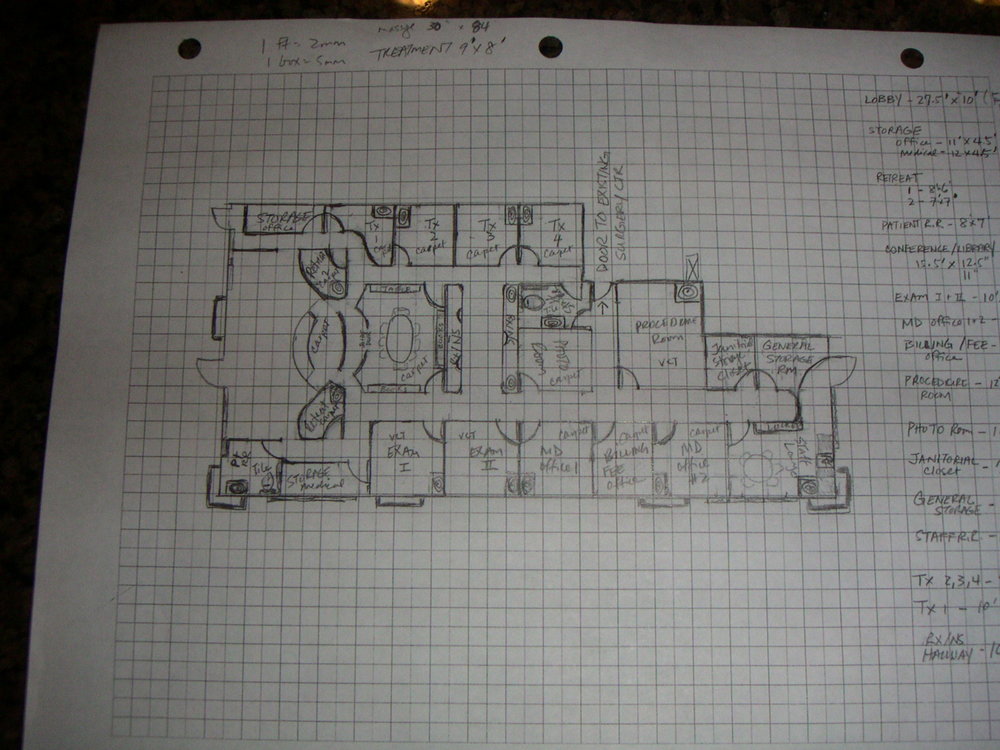 freehand sketch of office. We did the tenant improvements.We scribbled this on a CVS purchased graph paper in a hotel lobby.
freehand sketch of office. We did the tenant improvements.We scribbled this on a CVS purchased graph paper in a hotel lobby.
Taking a break from the sight-seeing, we enjoyed the air conditioning in a hotel lobby. There, we took out a newly purchased piece of graph paper from a nearby CVS and drew out our "dream office." And that night, I dreamt up the name Surgical Artistry and wrote that down on a napkin so I wouldn't forget. I drew a logo for it too, which had a knife on it, but it looked too scary. My cousin suggested a better logo, and she created the one that is the one we currently use.
A few days later we met with a lawyer, an accountant, and a banker. We were able to borrow from banks, credit cards and our families over a million dollars to get started on this project. We debated the city that we would choose for our project. But we chose not to move. Our reputations have already been earned in Modesto, CA. I used to log over 800-1000 operating room cases per year in general surgery which included trauma and vascular surgeries. At that time, I was a very eager, gung-ho, young general surgeon always looking for more surgeries whenever possible. My wife frequently saw over 40 patients per clinic day and logged over 150 breast reduction cases per year. She had a well rounded plastic surgery practice at the time. I only have access to these statistics regarding her practice. All this came to an abrupt stop, but just as suddenly, our new project grew.
 We leased a space in a building near our house so we could watch the tenant improvements over the next 4 months. My wife immediately shared space with another physician in town. She lost only 1 month of work. She just needed a space to see surgical patients and took only cosmetic patients in the beginning because getting back on board with insurances takes months. This eventually pushed her ratio into a 95% cosmetic practice. We purchased a vein laser, brand new OR lights, an ultrasound machine, a OR table, exam tables and stools. Everything was new. The build-out was quite a learning experience but in the end we had fun. We took out ads saying that my wife had moved her plastic surgery practice. I, on the other hand, hadn't decided if I wanted to restart my general surgery and trauma practice. My wife gently encouraged me to consider otherwise and become an aesthetic physician. Meanwhile, I enrolled in a medical acupuncture year long course affiliated with Stanford University. I figured it was my chance to learn something new. Eventually I decided to give the aesthetic medicine and acupuncture a try and I am now happy for the decision.
We leased a space in a building near our house so we could watch the tenant improvements over the next 4 months. My wife immediately shared space with another physician in town. She lost only 1 month of work. She just needed a space to see surgical patients and took only cosmetic patients in the beginning because getting back on board with insurances takes months. This eventually pushed her ratio into a 95% cosmetic practice. We purchased a vein laser, brand new OR lights, an ultrasound machine, a OR table, exam tables and stools. Everything was new. The build-out was quite a learning experience but in the end we had fun. We took out ads saying that my wife had moved her plastic surgery practice. I, on the other hand, hadn't decided if I wanted to restart my general surgery and trauma practice. My wife gently encouraged me to consider otherwise and become an aesthetic physician. Meanwhile, I enrolled in a medical acupuncture year long course affiliated with Stanford University. I figured it was my chance to learn something new. Eventually I decided to give the aesthetic medicine and acupuncture a try and I am now happy for the decision.
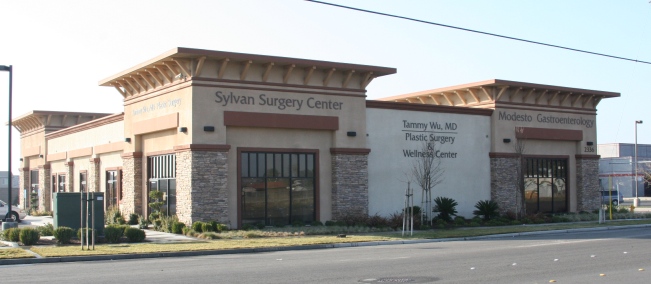 Outside view of our office. We are in 1/3 of this building.
Outside view of our office. We are in 1/3 of this building.
Can you tell us how your clinic runs?
We're located in Modesto, CA. Modesto in the middle of the state of California - in the Central Valley. I offer services in acupuncture, vein treatments, Botox, and fillers. I teamed up with my wife who is a plastic surgeon who performs mostly cosmetic procedures such as tummy tuck, breast augmentation, face lift, and liposuction. She also does breast reductions and reconstruction.We are also the office managers. There is no separate person designated as office manager. We are very hands on in the operations of the entire office. We have an outside biller for insurances, outside bookkeeper and 3 full time employees. Our office size is roughly 3000 square feet with three separate air conditioning zones. We have a large procedure room with two fancy operating room lights for great visibility and we are equipped with surgical sterilization equipment for minor in-office procedures.
Are there anything in the design of your clinic that you would change?
I would like to have more closet space. I love the built-in cabinets that were done. I wished I had spent more time figuring out where the electrical plugs would go. I don't know what I was thinking putting a sink in each of the doctor's offices. It's used as a shelf to hold clutter. Hardwood floor buckles. Vinyl composite tile does too. I should have made sure the concrete below us was better waterproofed. I would love to have two procedure rooms instead of one. Vein patients take a while to get out of these rooms because of stockings and dressings. I probably should have sacrificed some of the space for the exam rooms (we have 8 exam rooms for the two surgeons) and replaced them with another procedure room.
Can you give us some insight into how you hire, manage and compensate your staff, and what you’ve learned about staffing a cosmetic clinic?
Getting the right people to help is fun and rewarding. But it does take effort. My wife and I came up with a list of qualities that we are looking in potential hires. On the top of the list is honesty and friendliness. Ability is on the list too, but further down. I truly value honesty above most other things. When someone makes a mistake, there is no need to hide it. We will all learn from it and improve and we'll move on. Friendliness is very important. First of all, I want the staff to get along with each other, and then have a big smile on their faces when they are dealing with patients - and really have a good time doing it.
I do think that my staff attitudes trickle down from my own attitudes. So I do my best to set a reasonably good example of integrity, high standards, and friendliness with patients.
We mainly compensate the staff on an hourly basis. Commission is perhaps a good idea, but it gets somewhat complicated and I didn't want to add more computations to my list of duties. Plus I didn't want commissions to cause the medical office to become a sales office. I know that additional money motivates people. But I also know that people are simply motivated by spreading the good word about great results. Reasonable human beings like to help others and promote something they truly believe in. Thus we work hard to get great results and show our staff that indeed, great results are obtained here at our office. We also try to (but do not require) have the staff use the same products we promote. They feel good about themselves and share their positive beliefs about our office, products, and services. In the end, the only workers who are on commissions are really myself and my wife. And we're very aware that we have to pay our staff first before we pay ourselves.
Every employee is different and comes with different set of skills, preferences, and problems. I was a neuroscience major in college and I came across the idea of using questionnaires which categorizes people into different general personality traits. Plus there is also a personality trait system in acupuncture which allows one to view physical manifestations of personality types called biopsychotypes. I also came across this categorization in a different way related to different "animals". I found a quiz that is easy to do and score. I made this an optional personality test for my employees. We have fun calling each other by our animal type and by learning each other's weaknesses and strengths, we are better able to forgive each other, and as a boss, I can more easily put people in the right positions. I also find it easier to forgive some of the problems that I already knew they were going to have. For certain personality types I have made a weekly checklist. This is the personality type that likes detail. For others I'll let them free form some more and come to work roughly when they want and leave when they want - they just log their hours.
I think I'm making this sound like torture. I don't think it is because many of the staff members take the quiz home and try to figure out their kids and their spouses. They report that they all had a good time with this exercise. And I hope it leads to greater understanding of each other.
Everyone has a makeup of all different types of personalities but there is one type that is usually most dominant. The four animas are the lion, otter, golden retriever, and beaver. This exercise has really helped us get along with each other. Currently in our office (including the doctors), we mainly have golden retriever types and beaver types. Golden retrievers are the very friendly, diplomatic, easy going folks who love other people - they make great front desk / first impression folks in the office. Beavers are self disciplined, detail oriented, and organized - they make great back office folks. I am an almost equal mixture of all four animals, but I mostly possess (by a small margin) the characteristics of the otter. The otter is outgoing, friendly, talkative, and enthusiastic. We otters do well in marketing positions and perhaps in sales. There are weakness tied to each animal type. But that's for another discussion.
Different personality types (or animal types) solve and prioritize problems differently. I can see that in our meetings. And by understanding each other's approaches and natural tendencies, we'll less likely fight and hold grudges when we disagree. I didn't make up this system of classification, it's quite genius in my opinion.
What IPL/laser technologies are you currently using and what do you think of them?
I have a Dornier 940 diode laser for endovenous ablation and surface vein treatments. In general, this part of the practice hasn't been very profitable compared to cosmetic surgeries done by my wife. If we didn't have surgeries, this laser may seem more worthwhile. The laser maintenance costs and upfront costs make this a part of the practice that I think isn't a great financial option. I do think it benefits the patients greatly. From a patient care standpoint, it's reasonably good. From a financial standpoint, I have not been impressed. I keep thinking it might be my marketing issue, but this is how we stand with this issue at this time. In general, I also prefer sclerotherapy over laser for surface vein treatments - I guess this doesn't help me market my vein laser. This laser doesn't get as much use as it might in another practice. Because I am doing all the office based minimally invasive procedures, I have not felt like I have the time to expand to other lasers or machine based technologies. I do think they have a great role in patient care. But regarding my experiences with finances of the only laser I have in the office, I'm hesitant to expand to other expensive machines with yearly maintenance costs. And I'm currently hesitant to expand to the duties of watching over another practitioner. Perhaps in time, this will happen to our practice, but for now, I like the simplicity of taking care of all my patients directly with myself involved throughout the entire process. I should mention that peels are available at our office. I think we're an office that depends on dexterity more than technology. We do enjoy the surgical aspects. There are other practices in our area who are great with IPL's and laser technologies. If the procedure seems appropriate we send our patients to the other practices. Many times, the other services overlap and unfortunately because we don't currently have other lasers/IPL's we do lose a few patients I believe. But it's not our goal to cover all basis of cosmetic medicine. It's quite a broad field and we are just two practitioners who already have a pretty full load. We like concentrating on what we do and strive for the highest level of success without getting overloaded with other procedures.
What are the hits and misses in marketing your clinic?
Marketing for our practice is mainly word of mouth. We have tracked where our patients come from (in yet another spreadsheet - we call it the "patient tracker" - it tracks the reason for the initial phone call to the date of scheduled surgery/procedure). Our #1 reason for a patient call is internet. But our #1 reason for a patient to convert from a phone call into a consultation or procedure is when one patient refers another patient. Thus word of mouth is most valuable. Our next most popular source of patients is from recommendation from local doctors (another form of word of mouth). Then a distant third is the location of our building (and signage), followed by internet websites. Websites comes in fourth for conversion into procedures, although it is first for making the phones ring. I have a reason to explain this. I'll get to it later. Lowest on our list is phone books, so we've pretty much given up on that except to have a one line listing in the white pages. We sponsor local activities in Modesto, CA because that is our passion; however, sponsorship have not converted into many patients that we could track directly.
Regarding social media, I use Facebook because I personally enjoy it. We have interactions with our current patients, and I think this may help in generating patient referrals. I'm not entirely sure how social media really helps. I don't think it's as tremendous as it's hyped out to be. I've tried advertising briefly (two months) on Facebook in the past. That effort hasn't really converted into actual patients coming through my front door.
I do my own search engine optimization and web design. For the most part it has been haphazard because of time issues. I don't really recommend to others to do it themselves, but I think we should all have a basic understanding of web design and SEO (search engine optimization). I have access to a ton of statistics related to search on my own websites. I'm sort of a statistics junkie. Ironically, most of the people coming to my web pages are not from the local market (which is what I prefer when having a aethetic related webpage). They are from other countries even. The searches are for "facial muscles", or "greater saphenous vein anatomy." But web pages are needed and are used as a reference for those thinking about coming to the office. Even though the best source of results oriented advertising is old fashioned word of mouth, the website helps guide new prospect to our office and keeps our phones ringing.
Our marketing efforts may be different from other practices. I'm thinking that it might have something to do with the fact that when patients book for cosmetic surgeries, they pay a non-refundable $200 fee to get into the schedule (just to get scheduled with my wife). I think with a hurdle such as this one, shoppers who find us via advertisements may get turned away. However, if a friend or a doctor mentioned that they should see us. They understand that the $200 fee is part of the process. I'm not sure that this consultation scheduling fee is a common practice with others. But it has certainly made our "no-show" rate zero. Just about everyone shows up on time for their appointments too. Most show up early to make sure they get the most out of their appointments. Could we improve our phone skills and convert more of them? Sure. I think we need to work on that, but I think word of mouth is hard to beat.
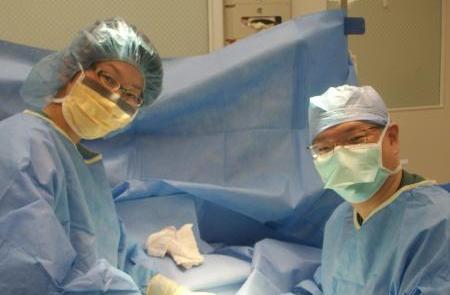 Husband and wife operating together
Husband and wife operating together
What treatments or services generate the most revenue in your clinic?
For our practice looking at both practitioners (the plastic surgeon who concentrates on cosmetic surgeries and I who works on facial injectables, veins, and acupuncture). The most profitable by far are the cosmetic surgeries. Of the cosmetic surgeries, the most profitable for our practice is breast augmentation, followed by tummy tuck, face lifts, and then liposuction. This profitability is also dependent on volume. I am not calculating this based on the amount of time spent - which is another way to look at this question (for example which procedure makes the most money per hour? Our answer is still breast augmentation).
If we're just looking at my practice (veins, acupuncture, facial injectables), the winner is sclerotherapy of veins (most profitable), followed by Botox, then fillers, acupuncture, and then laser of veins. Skin care sales is at the very bottom, but is still a little profitable. All of the above information takes into account overhead. We bring in more dollars with Botox compared to sclerotherapy, but the overhead attributed sclerotherapy is much lower than Botox. Plus the sclerotherapy patients become repeated patients as well. Similar to Botox patients.
What is one of the most important things that you've learned regarding cosmetic medicine?
I've learned that there are many complexities to the cosmetic medical visit. I think communication is key to understanding each person's needs, goals, and motivations. Communication is also vital to explaining what I can realistically do with my hands, medicines, and instruments. An important component of communication is allowing for enough time. I'm not the ultimate master of communication, but I would like to continue working on improving my skills. I think that communication is one of the key ingredients to a happy procedural outcome.
What advice would you give to other physicians based upon your experiences?
- Patients as teachers
Patients are the best teachers. Follow up visits are great learning experiences. You can learn what makes a patient happy and what bothers them. I’m still learning. When a patient complains about something (and there WILL be complaints),they are giving me an opportunity to make it right. I have also learned that I can’t possibly make all patients happy, but I will try. - Use Spreadsheets to measure improvement
Use spreadsheets for tracking. Spreadsheets are wonderful tools. If you can measure it, you can manage it. Thus if we’re looking to improve something, such as conversion rates from phone calls to surgeries, spreadsheets are a great way to track improvement. We use a old version of excel that is on all computers. I often hear a groan from my office staff, “not another spreadsheet!” - Don't have too many skin care products
Regarding skin care products, we used to have more products than we do now. What we found was that the products start competing with each other and it is also hard to keep up with inventory and ordering. We’ve try to pick out the best of the best and not have too many similar products. Perhaps if you have an essthetician, more products would work. But for us, too many of these create more work and complexities. Skin care products in our office is our lowest revenue producer. Regardless, it is not zero. Our efforts spent on skin care products is worthwhile because great skin care products compliment our great results. It also guides the patients into the right products. I think it’s necessary, but it is definitely on the bottom of the food chain when it comes to revenue generating sources. But these products keeps the patients coming back to the office and sometimes when they come back to pick up a product, they will enquire about a service such as surgery. One thing though, is competition with internet skin care sites. There are many bargain hunters out there, but there are also many patients who are afraid of getting fakes on bad services from internet discount sites. We feel that if we discount the products too low, we wouldn’t be able to provide the excellent service. - The world of aesthetics is vast.
You can choose to be the master of the entire realm, but for us, to keep our lives simpler but our plates full, we’ve chosen to focus on procedures which involve dexterity – which is mainly surgery and facial injectables. My thoughts on this, as long as I feel that the schedule is pretty full, the simpler focused life works. But diversification such as doing leg veins and acupuncture keeps the day interesting and makes me feel like I’m better prepared in case any aspect of the practice were to fall out of favor due to a weakened economy or public sentiment - Electronic Medical Record
I love having an EMR. I don't particularly like the EMR that I have, but I can make do with it. I love the concept of having one because it saves chart space, multiple users can access it at the same time, and I can look up information from remote locations. I wish I had spent more time looking at options. I went for a low cost solution at the time, and it might not have been the brightest choice. - I think websites are important replacement of phone books. Note to self: consider a professional when it comes to design and SEO
Even though our best marketing device is word of mouth. I think one of the best things that one can do in addition to internal marketing is having a good website which shows up well on internet searches. I don't really know how expensive it is to hire others because I do all the internet stuff myself. It's my hobby, it's what I like to do. I may have made one of the first plastic surgery websites ever. I was hired by Brown University to make their Plastic Surgery webpage back in 1995. I wonder if it was one of the first plastic surgery pages ever. Perhaps someone will tell me they have made one even earlier than that. Unfortunately because I don't spend buckets of time on the websites, they have a disjointed amateur look. To avoid this, you should hire a web designer (I would benefit from doing that). You will still have to spend a bunch of time getting the pages just right and you have to supply the material. But having a web designer is like having a coach - he/she will make you write the text needed with deadlines. Plus they can program in a way for you to add material to your new webpage.
In addition to a good designer, get a good search ranking by getting SEO help from a professional. SEO is search engine optimization. In some cases this could be the same firm or same person as the web designer. In general I would consider hiring someone with more clout and more pages worked on. These professionals have access to things that I don't have as a mere individual interested in SEO. They have the ability to link together several plastic surgeons to help in your search ranking. And many specialize in plastic surgery (yes, try to find one that specializes in plastic surgery or aesthetic medicine) where they own authoritative plastic surgery resource websites which rank very high in the world of search and if they give you a link from their authority page - you will rise in your own ranking. I have tried myself to round up my plastic surgery friends and to get them to link pages to each other. But every single one of them couldn't make this happen. Professional companies who design these pages can link them all together - in a matter of seconds. Me, on the other hand had email going back and forth (even with cut-and paste html code - one of the web languages) and in the end nothing happened.
Professional SEO companies try to keep up with the latest on SEO changes. For example, over the last two years, Google had two major changes to the search algorithm. This very past one, I was beat up and all my #1 sites dropped due to problems such as over-optimization (too much of a good thing). See this link for a description of my recent SEO sins and failures. And here I am slowly trying to figure out what's going on and trying to see if I can improve on the situation again. I think if I had hired a professional, I might not have the problems that I recently experienced. And if I did, they would be scrambling to fix it, not me. In my case, I'm sort of ignoring it, but that's not the right thing to do.
You might need to learn a few things about SEO to make sure the professional that you hire doesn't do anything that's considered "black hat" tricks and to make sure you're getting your money's worth. But if you want to do it like I do - make your own websites and do your own SEO. The main cost is time. But if you enjoy it, like I do, it's no work at all. I have some robust features on my website hosting service so my costs are probably higher than others. I own over 300 domain names. Here's the breakdown of website costs and doing it yourself. The hosting service costs me $95 per year but this is split among the many different websites that I have. I have been with the same hosting company since 1998. I can host as many websites as I want - unlimited for that price. And each domain (website) registration costs about $10 per year. You might have to shop around for a good price and of course service. I don't need much service because I'm pretty self sufficient. You need to pay for both hosting and for registration. It used to cost much more for domain registration and hosting, but I watched the prices drop over the past almost 2 decades. If I were to figure out my cost per domain name such as www.modestotummytuck.com it would be about $10.50 cents per year. And doing SEO for me perhaps is like doing crossword puzzles for others. There are no hard costs associated with doing my own SEO except for reading, thinking, strategizing, writing, and time. I guess I could buy back-links, but that would be cheating. I would love it if someone would tell me how much it costs to get a website made and perhaps the cost of SEO. I have a feeling that it would cost a lot more than $10.50 per year.
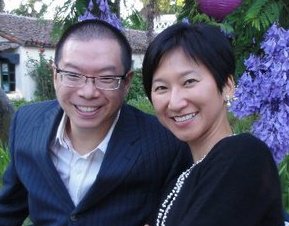 Dr. Lee and Dr. Wu spending more time together
Dr. Lee and Dr. Wu spending more time together
Life is good
Overall, I love doing all the things that I do in our practice. Owning my own practice and being an aesthetic physician (instead of a general/trauma surgeon) has given me more choices and opportunities. For example I can choose to practice more violin. I can choose to assist in surgeries with my wife. In the past when we were employed by two different groups in town, I got strange looks for assisting in my wife's surgeries. Probably because they were competing groups. Now, there's no gossip about operating together. I can choose to make my own websites and do my own SEO. I can choose my own software, and write them even, and make my own spreadsheets. I have opportunities to sponsor events in my community such as the symphony and the marathon. I have the opportunity to utilize many of my diversified talents. It's good to feel more in control of one's life. With my own aesthetic practice, not only do I look better, I now have the potential to live longer.
About: Dr. Calvin Lee grew up in the suburbs of New York City. Then he went to undergraduate and medical school at Brown University. He enjoyed playing violin through his university days and was privileged to have been the concertmaster and winner of the university-wide concerto competitions. He felt that being a general surgeon was similar to being in the spot light of performances and required the dexterity of violin playing. He met his wife, Dr. Tammy Wu, at Brown and she became a plastic surgeon. He finished his general surgery residencies at Case Western Reserve and Southern Illinois University.
 Dr. Calvin Lee rehearsing the Mendelssohn violin concerto at the Hong Kong Cultural Center in 2009
Dr. Calvin Lee rehearsing the Mendelssohn violin concerto at the Hong Kong Cultural Center in 2009
In 2003 he and his wife moved to Modesto, California. He was pursuing his goal at the time of a broad based general surgery practice. Modesto was a location that offered the options of such a practice. His other dream was to be able to share a practice with his wife. With his penchant for diversity, he decided to join his wife's practice in 2006, and she gave him the role of minimally invasive aesthetics and office management. At first she guided him carefully over the intricacies of aesthetic medicine. It was a great benefit to him to have a wife who built a fellowship in aesthetic medicine. As with any field, learning is a lifelong process. He feels very fortunate that it is a family goal - for them to be in similar fields. They get to operate together and look for learning opportunities as a family.
This interview is part of a series of interviews of physicians running medical spas, laser clinics and cosmetic surgery centers. If you'd like to be interviewed, just contact us.
